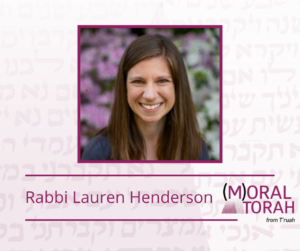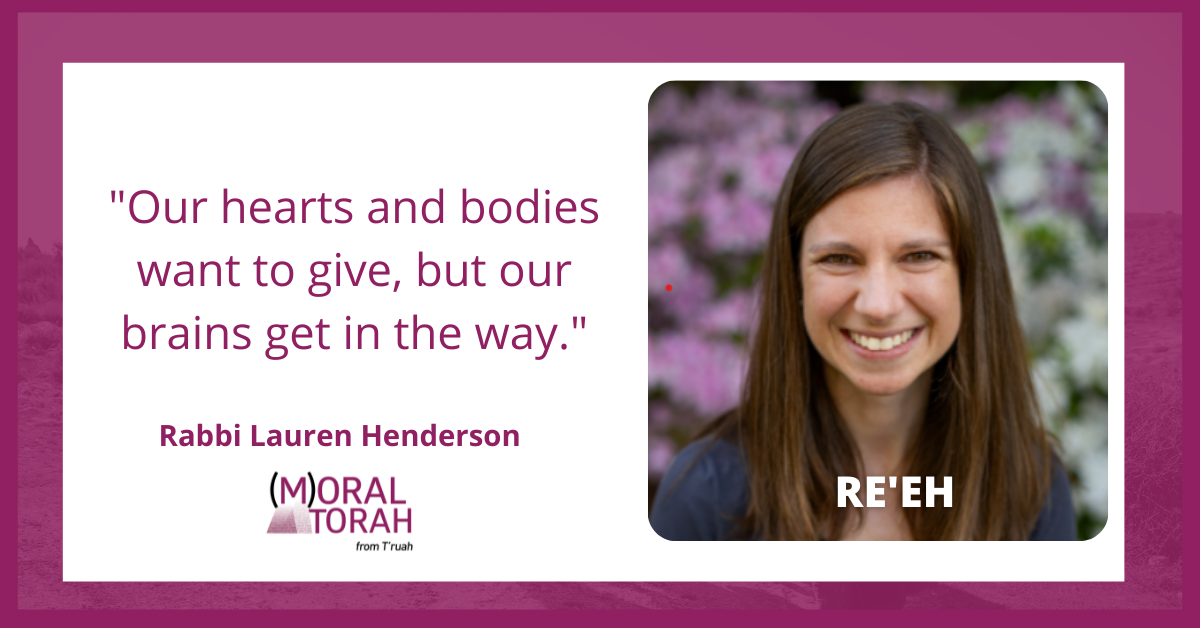A D’var Torah for Parshet Re’eh by Rabbi Lauren Henderson
On the Sunday of MLK Jr. weekend 2021, during the height of COVID, our shul in the suburbs of Atlanta held a drive-through canned food drive for our local food pantry. I stood at the head of the line, greeting our families as they pulled up to drop off canned green beans and ramen noodles.
A car pulled up and the driver, a tired looking man who appeared to be in his 50s, leaned over and said, “I used to go to this shul. I haven’t been here in a long time. But I’m in need of some money so I can make my next utility payment. Can you give me a loan?”
And then, about 20 minutes later, a minivan pulls up. In it was a young couple in their 20s, with a toddler in the backseat. “We live in the apartment complex across the street. We saw that you’re giving out food… do you have anything that you can give us?”
I don’t know why I was so surprised that people felt comfortable coming to a synagogue to ask for money or food, but I was. Maybe because there is so much shame and stigma attached to poverty, and usually such asks happen anonymously. Maybe because I know of plenty of other food pantries in our local community that are better equipped to meet these needs regularly, and we were just a pop-up food collection site. But for a brief moment, the barriers that normally exist between givers and receivers were lifted, and we were able to serve as a channel for resources to get where they needed to go.
Sign up to receive (M)oral Torah in your inbox each week.
But I have to admit that because of my American conditioning, I had to overcome my initial impulse to close my hand and say, “Sorry, we’re collecting food, not giving it out — you’ll have to go down the road to the Community Assistance Center if you want help.” The reflex to say no is strong, and I was caught off guard. So I deeply appreciate and relate to the insights into human psychology from our parshah, Re’eh:
“If, however, there is a needy person among you, one of your kinsmen in any of your settlements in the land that the ETERNAL your God is giving you, do not harden your heart and shut your hand against your needy kinsman. Rather, you must open your hand and lend him sufficient for whatever he needs” (Deuteronomy 15:7-8).
Drawing on the much older midrash from Sifrei Devarim, Rashi (11th century France) explains the need for both the negative and the positive formulation of this mitzvah of generosity. “Do not harden your heart” refers to those of us who go back and forth in our heads, saying “Should I give this money? Maybe I shouldn’t…” The verse tells us: don’t overthink this. Just do it. And “you must open your hand” refers to those who stretch their hand forth and look as if they’re ready to give, but then rescind the offer.
Our hearts and bodies want to give, but our brains get in the way.
Find more commentaries on Parshat Re’eh.
I learned from Rabbi James Jacobson Maisels that we should strive to practice compassion in such a way where we don’t have to actively choose to be compassionate in any given moment. We see a need, and our hearts are reflexively moved to open; we respond to meet the need that is directly in front of us. Compassion should become so habitual that it overrides our thinking minds.
 So now, I’m thinking about what it would take to lift both these external and internal barriers to generosity and compassion. I’m imagining the ideal community, where the physical gates are open for all to give what they have and take what they need, where the barriers of shame and stigma that keep us from asking for help are lifted, where the learned reflexes around scarcity that cause us to close our hands around what we believe to be “ours” can be softened, and turn to outstretched, open palms.
So now, I’m thinking about what it would take to lift both these external and internal barriers to generosity and compassion. I’m imagining the ideal community, where the physical gates are open for all to give what they have and take what they need, where the barriers of shame and stigma that keep us from asking for help are lifted, where the learned reflexes around scarcity that cause us to close our hands around what we believe to be “ours” can be softened, and turn to outstretched, open palms.
May we train ourselves in habits of compassion and create structures with open gates that enable us to open to one another, again and again and again.
Rabbi Lauren Henderson serves Congregation Or Hadash in Sandy Springs, Georgia, a community of compassionate, open-hearted folks bringing their Jewish spiritual practice as avodah/service to the healing of our world.


